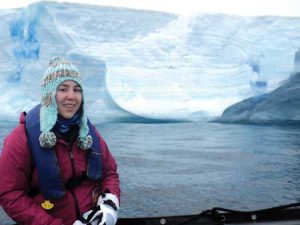
By Laura Marie Drudi
I left Montreal’s winter behind in early February, a winter that pales in comparison to what awaited me down south. I left the comfort of my urban home and my medical textbooks, and shifted gears. I decided to do a medical elective with the Students on Ice Program and joined 50 other international students, including nine other McGill students, who shared my eagerness, passion, and enthusiasm for adventure.
It’s hard to imagine that I am at the southernmost end of the world in Antarctica. A year ago, I wouldn’t have dared to dream of becoming a member of an expedition to one of the most isolated environments on this planet.
It all began when I stumbled on this unique program. Then, after a year’s worth of hoping, fundraising and planning, my goal to travel to Antarctica was transformed into a reality.
Students on Ice aims to foster future environmental ambassadors through hands-on educational experiences on climate change in the Polar regions. It is designed to educate students about climate change and more specifically how human activity is affecting the poles. There are many different working groups and workshops on the expedition, including some on oceanography, glaciology, marine biology and geology and others on first aid and remote medicine. Through these interdisciplinary activities, I’m gaining insight, knowledge and tangible experience in climate change. From changes in sea temperatures, salinity and levels to alterations in the marine ecosystems, I’m seeing these changes right before my eyes.
There are really no words to describe all we have seen and done on this expedition. One of the most memorable moments was when our vessel, the M/V Ushuaia, made its way into Paradise Bay. I admired the scenery of the cove, stared in awe at the majestic waters and soaked in the surrounding peace and tranquility. Silence permeated the cove. Then, the sounds of nature began to emerge, from the cracking of ice, to petrels flying to their nesting ground and a lone penguin swimming in the cove. This place is most aptly named, because it is truly a paradise on Earth.
Antarctica is one of the most remote and isolated areas on our planet, and I got a glimpse of how unforgiving it can be with the bone-chilling cold and wet and windy weather. This makes it a great analogy for the most remote, isolated and hostile environment that we know – that of space, and as such, a great platform for research in this field. To see Antarctica firsthand was wonderful given my avid interest in the space industry and my passion for pursuing a career as an aerospace physician.
Remote medicine applications will be useful to individuals in the remote regions of the globe and to those of us venturing out of Earth’s gravity. I hope to one day be a leader in this area. I don’t think I have seen the last of Antarctica. My goal is to come back here as a physician and participate in remote medicine research at McMurdo Station in McMurdo Sound. What an experience that would be!
This voyage has truly been inspiring. I don’t think many of us truly realize how this experience has been life-changing and how it has shaped the people we will become in the future. But that in itself is another expedition – a lifelong expedition of self discovery, and one I am willing to embark on whole heartedly.
Laura Drudi is a third-year McGill medical student. She was part of the Students on Ice expedition to Antarctica.
